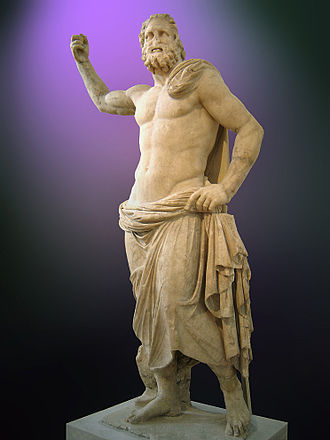নেপচুন (দেবতা)
শুদ্ধ জল ও সমুদ্রের রোমান দেবতা
নেপচুন (লাতিন: Neptūnus [nɛpˈtuːnʊs]) হলেন রোমান ধর্মের মিষ্টি জল ও সমুদ্রের দেবতা।[১] তিনি গ্রিক দেবতা পসেইডনের রোমান প্রতিরূপ।[২] গ্রিক-প্রভাবিত মতবিশ্বাসে নেপচুন হলেন স্বর্গ ও পার্থিব রাজ্যের অধিশ্বর জুপিটার এবং পাতালের অধীশ্বর প্লুটোর ভাই।[৩] তাঁর পত্নীর নাম সালাশিয়া।

রোমান মোজাইকে, বিশেষত উত্তর আফ্রিকা অঞ্চলের মোজাইকগুলিতে, নেপচুনের ছবিগুলি হেলেনীয় প্রথার দ্বারা প্রভাবিত।[৪] নেপচুনকে সমুদ্রের আগে সম্ভবত মিষ্টি জলের ঝর্নার দেবতা মনে করা হত।[৫] পসেইডনের মতো নেপচুনকেও ঘোড়ার দেবতা মনে করা হত। রোমানরা তাঁকে নেপচুনাস ইকুয়েস্টার (লাতিন: Neptunus Equester) নামে ঘোড়দৌড়ের অধিদেবতা হিসেবে পূজা করত।[৬]
তথ্যসূত্র
সম্পাদনা- ↑ J. Toutain, Les cultes païens de l'Empire romain, vol. I (1905:378) securely identified Italic Neptune as a saltwater sources as well as the sea.
- ↑ Larousse Desk Reference Encyclopedia, The Book People, Haydock, 1995, p. 215.
- ↑ About the relationship of the lord of our earthly world with water(s) Bloch, p. 342-346, gives the following explanations: 1. Poseidon is originally conceived as a chthonic god, lord and husband of the Earth (for the etymolog gearoid γαιήοχος, he who possesses the Earth, εννοσίδας he who makes the Earth quake) with an equine form. He mates with Demeter under this form in the Arcadian myth from Thelpusa, they beget the racing horse Areion and the unnamed daughter of those mysteries (story in Pausanias VIII 25, 3). 2. Poseidon hippios (horse) is the god of Earth and as springs come from beneath the earth, this is also a metaphora (or better a figure) of the origin of life on Earth; the horse is universally considered as having a psychopompous character and Poseidon is known as tamer of horses (damaios) and father of Pegasus who with its hoof can open up a spring. 3. Poseidon is the god worshipped in the main temple of the Isle of Atlantis in the myth narrated by Plato in the dialogues Timaeus and Critias; there was also a hippodrome nearby. 4. The island was swallowed up by an earthquake caused by Poseidon himself. This factor would connect the power over earth and that over waters. The Greek had a memory of the explosion of the Island of Santorini and of the seaquake it provoked as well as other consequences affecting climate.
- ↑ Alain Cadotte, "Neptune Africain", Phoenix 56.3/4 (Autumn/Winter 2002:330-347) detected syncretic traces of a Libyan/Punic agrarian god of fresh water sources, with the epithet Frugifer, "fruit-bearer"; Cadotte enumerated (p.332) some north African Roman mosaics of the fully characteristic Triumph of Neptune, whether riding in his chariot or mounted directly on albino dolphins.
- ↑ Dumézil, La religion romaine archaïque, 381, Paris, 1966.
- ↑ Compare Epona.
বহিঃসংযোগ
সম্পাদনাউইকিমিডিয়া কমন্সে নেপচুন (দেবতা) সংক্রান্ত মিডিয়া রয়েছে।
- Warburg Institute Iconographic Database (ca 600 images of Neptune) ওয়েব্যাক মেশিনে আর্কাইভকৃত ৪ মার্চ ২০১৬ তারিখে
- চিসাম, হিউ, সম্পাদক (১৯১১)। "Neptune (god)"। ব্রিটিশ বিশ্বকোষ (১১তম সংস্করণ)। কেমব্রিজ ইউনিভার্সিটি প্রেস।